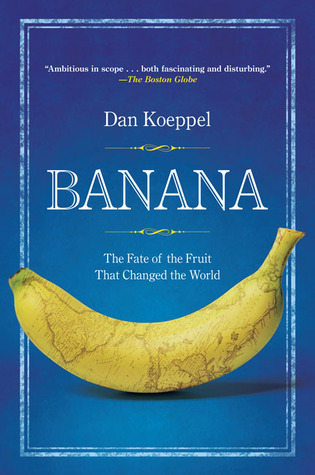 I
loved looking at history through banana-colored lenses. Dan Koeppel wrote one of the most unique and intriguing books I've ever read. He did a lot of research, went around the
world to interview experts, and managed to write a book that focuses on
the history and science of the banana. The book kept my interest quite
high from beginning to end. The structure is not linear
at all, it would be best visualized with a firework explosion, but in a
sense it works even better this way: it's like sitting down in a pub
with one of the top experts on bananas, getting him completely drunk,
and listening to him rant away. The result is a "narrative" that jumps
around, gets distracted, goes back, has sudden moments of humor and
unexpectedly moving paragraphs, but it all kind of fits together nicely.
I really liked it that way. Despite the large amount of facts and
trivia, the book is a light read.
I
loved looking at history through banana-colored lenses. Dan Koeppel wrote one of the most unique and intriguing books I've ever read. He did a lot of research, went around the
world to interview experts, and managed to write a book that focuses on
the history and science of the banana. The book kept my interest quite
high from beginning to end. The structure is not linear
at all, it would be best visualized with a firework explosion, but in a
sense it works even better this way: it's like sitting down in a pub
with one of the top experts on bananas, getting him completely drunk,
and listening to him rant away. The result is a "narrative" that jumps
around, gets distracted, goes back, has sudden moments of humor and
unexpectedly moving paragraphs, but it all kind of fits together nicely.
I really liked it that way. Despite the large amount of facts and
trivia, the book is a light read. The author tried to infuse this work with an overarching drama, which is "a banana blight that is tearing through banana crops worldwide". This is a fact, however there seem to be some solutions in place, and at least several alternatives. In any case, some chapters end with melodramatic sentences like "this is why the banana you eat today might be the last of its kind you eat. Ever!". Hilarious! Please, please, go on! Bring us another one of whatever this guy is drinking!!
The book is full of fun banana facts and information that will change your outlook on, erm... bananas. For example, did you know that the banana, and not the apple, was the fruit referred to in ancient texts about the Garden of Eden? The Fertile Crescent's climate was not conducive to apples. The forbidden fruit was called a "fig", which is also what the banana was called.
Koeppel spent many chapters on the history of United Fruit, the modern Chiquita. I knew it was a history of violent colonialism, but I didn't know to what extent. The history of the "banana republics" of Honduras, Guatemala, Panama, etc. is fascinating, dark and disturbing. Guatemala in particular, with the CIA-orchestrated conspiracy / coup that was very much related to United Fruit and bananas.
One minor flaw: the focus seems to be almost entirely on American bananas and their history, only a little bit on South-East Asia, and almost nothing on Africa. The book would have been more complete if it expanded a bit more on Africa and what the fruit meant for African history, too.
In the end, the author recommends us to buy fair trade bananas, to help plantation workers, and he gives us a bit more background, without pushing that agenda too much. This book will widen your horizons, and make you want to eat bananas so badly you'll want to scream.
No comments:
Post a Comment